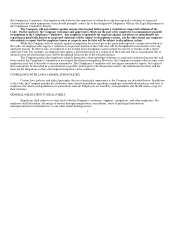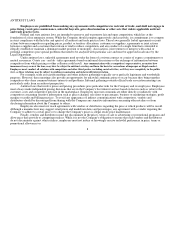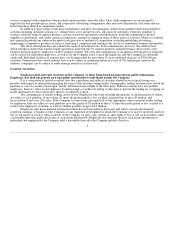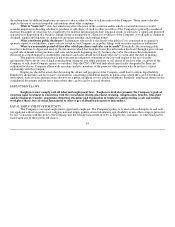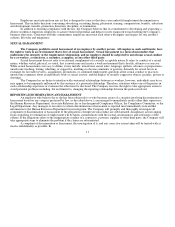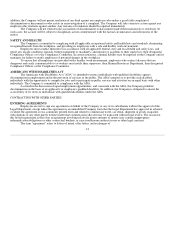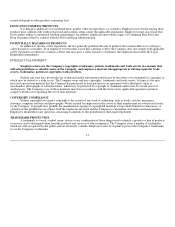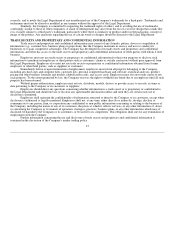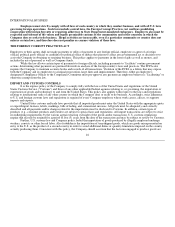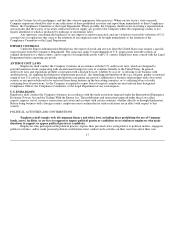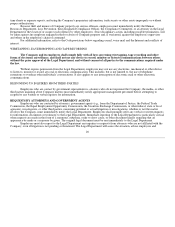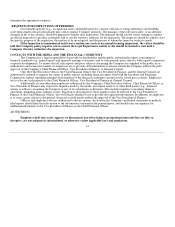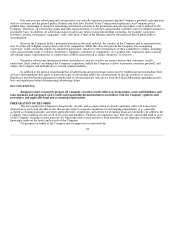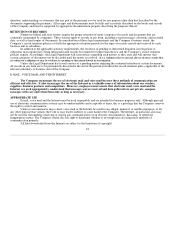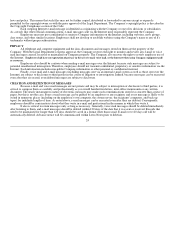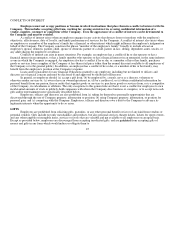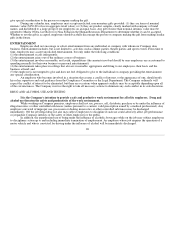Neiman Marcus 2002 Annual Report Download - page 154
Download and view the complete annual report
Please find page 154 of the 2002 Neiman Marcus annual report below. You can navigate through the pages in the report by either clicking on the pages listed below, or by using the keyword search tool below to find specific information within the annual report.
not on the Customs list of transshippers, and that they observe appropriate labor practices. Where on-site factory visits are made,
Company employees should be alert to any indications of these prohibited activities and report them immediately to their Compliance
Officer, the Compliance Committee or the Legal Department. Where possible, the Company should secure in writing a representation
and warranty that the factory or factories contracted will not supply any goods to the Company where the originating country is not
legally identified or which is produced by underage or involuntary labor.
Any questions concerning the legitimacy of any import or export transaction, and any violations or possible violations of U.S.
customs laws or regulations that come to the attention of any employee must be brought immediately to the attention of the
Compliance Committee or the Legal Department.
EXPORT CONTROLS
Under the Export Administration Regulations, the export of goods and services from the United States may require a specific
export license from the Commerce Department. The same may apply to transshipment of U.S. origin goods from the country of
original destination to a third country, and to exports of foreign made goods with U.S. content. Employees must consult with the Legal
Department before exporting any goods.
ANTIBOYCOTT LAWS
Employees shall conduct the Company's business in accordance with the U.S. antiboycott laws, which are designed to
prevent businesses from cooperating with unsanctioned foreign boycotts of countries friendly to the United States. In general,
antiboycott laws and regulations prohibit cooperation with a foreign boycott, whether by way of: (i) refusing to do business with
another person; (ii) applying discriminatory employment practices; (iii) furnishing information on the race, religion, gender or national
origin of any U.S. person; (iv) furnishing information concerning any person's affiliations or business relationships with a boycotted
country or any person believed to be restricted from doing business in the boycotting countries; or (v) utilizing letters of credit
containing boycott provisions. As the Company is required to report boycott requests, employees must inform their designated
Compliance Officer, the Compliance Committee, or the Legal Department of any such requests.
U.S. EMBARGOES
Employees shall conduct the Company's business in accordance with the trade restrictions imposed under the International Emergency
Economic Powers Act and the Trading With the Enemy Act. The prohibitions and restrictions imposed under these laws affect
exports, imports, travel, currency transactions and assets and accounts with certain countries, whether directly or through third parties.
Before doing business with a foreign country, employees must confirm that no trade restrictions are in effect with respect to that
country.
POLITICAL ACTIVITIES AND CONTRIBUTIONS
Employees shall comply with all campaign finance and ethics laws, including those prohibiting the use of Company
funds, assets, facilities, or services to support or oppose political parties or candidates or to reimburse employees who make
donations to support or oppose political parties or candidates.
Employees who participate in the political process, express their personal views on legislative or political matters, engage in
political activities, and/or make personal political contributions must conduct such activities on their own time and at their own
17


